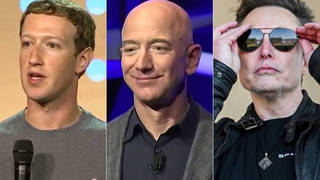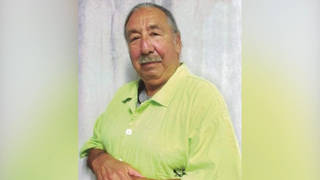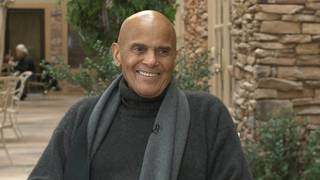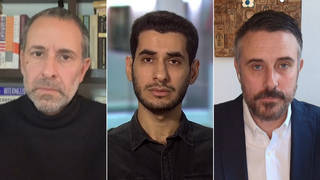
Related
This week, the civil rights movement lost two of its torchbearers. Rev. Fred Shuttlesworth died at the age 89, and Derrick Bell died at the age of 80. Rev. Shuttlesworth led the struggle to end segregation in Birmingham, Alabama. He was the last of the civil rights movement’s “Big Three,” founding the Southern Christian Leadership Conference along with Rev. Dr. Martin Luther King, Jr., and the Rev. Ralph David Abernathy. A legal scholar and civil rights activist, Derrick Bell sought to expose American racism through his books, articles and career sacrifices. As the first tenured black professor at Harvard Law School, Bell gave up his position in protest of the school’s allegedly discriminatory hiring practice. For more on the lives and legacies of Fred Shuttlesworth and Derrick Bell, we’re joined by Rev. Jesse Jackson, president and founder of the Rainbow/PUSH Coalition. [includes rush transcript]
Transcript
AMY GOODMAN: We turn now to the civil rights movement, which has lost two of its torchbearers. Fred Shuttlesworth died at the age of 89, and Professor Derrick Bell died at the age of 80 this week.
Reverend Fred Shuttlesworth led the struggle in Birmingham, Alabama, to end segregation. He was the last of the civil rights movement’s “Big Three,” founding the Southern Christian Leadership Conference along with Reverend Dr. Martin Luther King, Jr., and the Reverend Ralph David Abernathy. In a statement, the civil rights leader and Georgia Congress member, John Lewis, called Shuttlesworth “the last of a kind,” adding, “When others did not have the courage to stand up, speak up and speak out, Fred Shuttlesworth put all he had on the line to end segregation in Birmingham and the state of Alabama.”
The legal scholar and civil rights activist Derrick Bell has also passed away. Bell sought to expose American racism through his books, articles. As the first tenured black professor at Harvard Law School, Bell gave up his position in protest of the school’s allegedly discriminatory hiring practice.
For more on the lives and legacies of Fred Shuttlesworth and Derrick Bell, we’re joined now by a modern-day torchbearer of the civil rights movement, Reverend Jesse Jackson, president and founder of Rainbow/PUSH. He’s joining us today from Michigan.
Reverend Jackson, welcome to Democracy Now! Talk about—
REV. JESSE JACKSON: Good morning.
AMY GOODMAN: Start with Fred Shuttlesworth.
REV. JESSE JACKSON: You know, NAACP was barred in many Southern states as a, quote-unquote, “communist” or subversive organization. And they banned the NAACP in Alabama. Fred Shuttlesworth helped organize the Alabama Christian Movement, which was the movement, in fact, that invited Dr. King into Birmingham. While Dr. King and Dr. Abernathy were operating between Atlanta, see, and Montgomery, Fred Shuttlesworth was the host of the Birmingham movement.
Fred Shuttlesworth was bombed while in bed. And so, when John Lewis used the word “courage,” it may be the operative word. He had that, willing to fight back. Dr. King, Reverend Abernathy and Fred Shuttlesworth in the Birmingham jail cell together. The height of the movement, or emotional point, may have been Birmingham, where the dogs were biting and Bull Connor was threatening, and the dogs were biting, and Dr. King’s book, Why We Can’t Wait. So, in the—the soul of the Birmingham movement, one could easily say, was Fred Shuttlesworth.
AMY GOODMAN: You had Dr. King, who was a Morehouse graduate, got a Ph.D. at Boston University. Fred Shuttlesworth had a very different background, Reverend Jackson.
REV. JESSE JACKSON: Well, he was a kind of rough and tough, grassroots kind of hands-on preacher. In other words, he was a carpenter, not an engineer. He was a street fighter. And the ministers rented him. And his courage became infectious, and so it was his friends who—embracement of us, who were students in the movement at that time, and again, the risk he took. There is a new South today, in so many ways, and one of the founding fathers of that new South, that new America, Fred Shuttlesworth, Dr. King, Dr. Abernathy. This weekend, when Alabama plays Vanderbilt, when it plays Auburn, that new South will be choosing teams on uniform color and not skin color, and direction, not complexion. That new South is the Fred Shuttlesworth South. That new South, where you can have international investment behind the cotton of the sealed curtain, Fred Shuttlesworth was one of the founders of that new South. There is now the—the airport is now named after him—the Fred Shuttlesworth International Airport—and appropriately so.
AMY GOODMAN: Reverend Jackson, I want to turn to a clip of Fred Shuttlesworth talking about the immediate, visceral danger he encountered as one of the leaders of the civil rights movement.
REV. FRED SHUTTLESWORTH: The Ku Klux Klan tried to blow me into heaven, blow me away. But you don’t kill leaders. You don’t kill the idea, if you kill the person. But God saved me, because he had to have somebody to go through a spectacular demonstration of his power to live in Birmingham. And when a detective said to me, he said, “If I were you, I’d get out of town as quick as I can,” I said, “Well, Officer, you’re not me. And you go back and tell your Klan brother that if God could save me through this, I’m here for the duration, and the war is on.”
AMY GOODMAN: And now I wanted to turn to Reverend Fred Shuttlesworth talking about how he was depicted in the media as a communist when partaking in the civil rights movement.
REV. FRED SHUTTLESWORTH: “Negro Pastor Heads Communist Front.” That was the headline when I was elected president of SCLC. Segregation at its core. The core had to be Birmingham, Alabama.
AMY GOODMAN: Reverend Jackson, take it from there.
REV. JESSE JACKSON: Well, that idea of he was not intimidated by the bombs, by the dogs, not by the threats, and that’s what made him such a different kind of person, because things we now take for granted, Fred Shuttlesworth was in the vanguard of that struggle. And so, he has earned deep admiration, not nearly the recognition he deserves, because it was Fred who was the host of the great Birmingham movement, and he never stopped fighting until the very end. So, we have high regard for Fred Shuttlesworth and his legacy.
AMY GOODMAN: Talk about Professor Derrick Bell. He was a professor at Harvard University Law School. Talk about his significance today.
REV. JESSE JACKSON: You know, while Fred was one of the kind of the carpenters, the hands on, with hammer and nail, one of those engineers was Dr. Derrick Bell. Here was a man who had hit the height of academia, a Harvard professor, and with tenure. Yet he had the sense of non-negotiable dignity. And he saw patterns of discrimination not being addressed. He confronted the university. And finally, he left. It’s difficult to get people to leave these tenured positions because of the comfort zone, but Derrick Bell never settled for the comfort zone. He always used his own sense of dignity. And to leave Harvard was a courageous and morally right thing to do. But it gave him tremendous moral authority in our civil rights struggle as an interpreter of our times.
AMY GOODMAN: I wanted to turn to a clip from WGBH 10:00 News in Boston, which aired this in December of 1990. The reporter Hope Kelly talks to Professor Bell, who is then teaching a seminar on civil rights at Harvard Law School. At the time, Bell was standing in solidarity with a dozen students who had filed a lawsuit alleging the school engaged in discriminatory hiring practices.
HOPE KELLY: Bell’s seminar is titled “Civil Rights at the Crossroads.” And every Monday, students flock. The catch is, they receive no credit, and their teacher receives no salary, by choice. Bell is on an unpaid leave that he says will continue until a woman of color joins the ranks.
PROF. DERRICK BELL: It certainly is a protest, and if they function, I would be very happy to have them function. But basically, I’m a teacher, and I know that you teach best by example. And my major effort in teaching is to convince students, particularly law students, more particularly Harvard Law students, that they should be ready and able to take risks and make sacrifices for the things they believe in.
AMY GOODMAN: That was Derrick Bell, and it ended up being why he left Harvard Law School. He also, Jesse Jackson, left University of Oregon for the same reason, when they refused to give tenure to an Asian woman law professor.
REV. JESSE JACKSON: Well, Dr. King argued that leadership must mold opinion, not follow opinion polls. And we’re measured by how we handle life in the face of adversity. He made the case oftentime that vanity asks the question, is it popular? And we all want to be received in some way. Is that politics—politics asks the question, can I win? And many stop right there at how to win. But morality asks, is it right? And it may need to be popular in our politics, “is it right” is a haunting question. Derrick Bell took the most difficult route, the “is it right” question. If it was not right, University of Oregon, Harvard University, he would not bow. And so, it is his sterling leadership—he’s one of the tall trees. I mean, there’s Thurgood Marshall, to be sure, in that tree—forest of tall trees. Derrick Bell has a solid place in the history of civil rights and social justice in this nation.
AMY GOODMAN: Interestingly, Professor Bell’s scholarly writings place him at the forefront of critical race theory, CRT, and while he was waging this battle at Harvard Law School, President Obama, then Harvard law student Obama, was head of the Harvard Law Review. We have 10 seconds. Reverend Jackson, you just wrote about Occupy Wall Street. Your thoughts on the Occupy movement around this country?
REV. JESSE JACKSON: The radical extremes of government-subsidized wealth, on the one hand, too many unnecessary expensive wars, on the other, driving poverty. That’s what’s driving the Wall Street protest, and now around the country, because student loan debt is greater than credit card debt, and we are driving people out of their homes. It is a cause of our time. And those people who are fighting around the nation, I stand with them, are demanding economic justice, demanding clemency. They deserve support, because they’re right.
AMY GOODMAN: Reverend Jackson, we leave it there. I thank you so much for joining us from Detroit.












Media Options